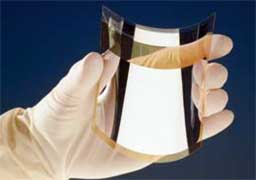(PV magazine) – A new photovoltaic (PV) module production plant has started operation in Astana. The project is a part of the state program to create a silicon industry in Kazakhstan. 60 MW are planned to be produced annually with an expansion up to 100 MW.

- While the photovoltaic cell market is currently dominated, to over 90%, by crystalline silicon, organic-inorganic composites, still at the stage of market-introduction feasibility studies, in terms of efficiency and reliability, are on their way to gaining acceptance in some specific areas.
Beyond improved performance for photovoltaic devices, in terms of efficiency and reliability, the real challenge is to achieve significant cost reductions per kWh generated. Plastic or polymer organic materials, affording great ease of utilizations, are on course to gain, alongside silicon, for solar cell fabrication, even though technological barriers do still remain, that need to be overcome.
(Photo: courtesy of CEA / A. Gonin)
The production capacity is expected to be reached in the first quarter of this year according to state-owned nuclear holding company Kazatomprom whose subsidiary Astana Solar operates the production plant. Kazatomprom states that the plant will operate “on the basis of 100% Kazakhstan silicon”. 175 Kazakhs will be employed at the production facility, some of them receiving training abroad. Astana Solar has already signed several take-off contracts.
The construction of the plant in Astana is part of a large-scale project realized by Kazatomprom in partnership with a French consortium headed by the Commissariat à l’Energie Atomique et aux Energies Alternatives (CEA).
The first project of the consortium, KazPV, includes Kazatomprom, KazSilicon, Astana Solar and Kazakhstan Solar Silicon on the domestic side and CEA, CEIS, ECM Technologies and SEMCO Engineering on the French side. The French partners are providing technical support and know-how which has also enabled the Astana PV plant to set up modern automation.
Implementation of this large PV program is designed for five stages:
- Establishing production and processing quartz
- Development of high-tech silicon production
- Improvement of solar-grade silicon production
- Establishment of monosilicon ingots production
- Production of solar panels
The joint-venture aims also to develop production lines in Ust-Kamenogorsk, in north-eastern Kazakhstan. The project implementation period is up to 2028. Kazatomprom states that with this endeavour it enters into long-term strategic commitment to invest via Astana Solar into renewable energy sources and clean technologies as part of its business diversification program.

